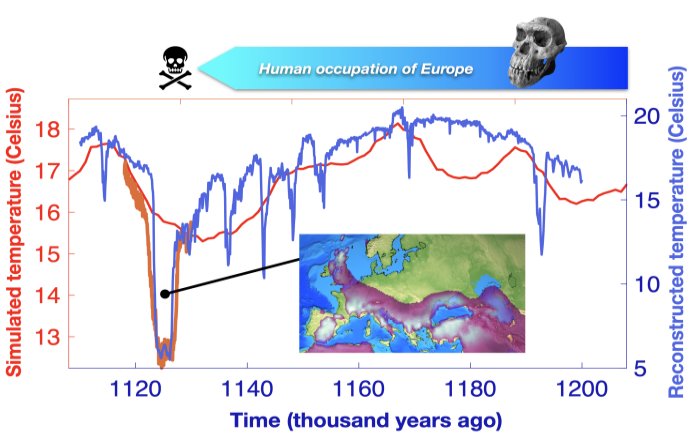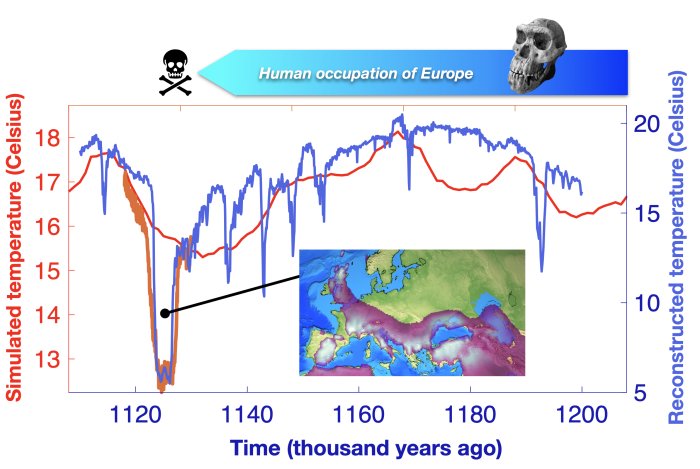Eddie Gonzales Jr. – MessageToEagle.com – A new study published in the journal Science finds that around 1.12 million years ago a massive cooling event in the North Atlantic and corresponding shifts in climate, vegetation and food resources disrupted early human occupation of Europe.
North Atlantic cooling event 1.127 million years ago, which contributed to the depopulation of Southern Europe. (Photo credit Homo erectus skull, Axel Timmermann). Pink shading in map highlights areas, where early human species suffered a major reduction in habitat suitability due to cooling, drying and reduction in food resources. Credit: Institute for Basic Science
The study published by an international group of scientists from the UK, South Korea and Spain presents observational and modelling evidence documenting that unprecedented climate stress changed the course of early human history.
Archaic humans, known as Homo erectus moved from Africa into central Eurasia around 1.8 million years. From there on they spread towards western Europe, reaching the Iberian peninsula around 1.5 million years ago (Ma). Experiencing initially rather mild climatic conditions, these groups eventually established a foothold in southern Europe, as documented by several dated fossils and stone tools from this period.
But given the increasing intensity of glacial cycles in Europe from 1.2 Ma onwards, it remains unknown for how long early humans lived in this area and whether the occupation was interrupted by worsening climate conditions.
To better understand the environmental conditions, which early human species in Europe experienced, the team of pollen experts, oceanographers, climate modelers, archeologists, and anthropologists combined data of a deep ocean sediment cores from the eastern subtropical Atlantic with new supercomputer climate model and human habitat model simulations covering the period of the depopulation event.
Sieving through thousands of small plant pollen stored in the ocean sediment core and analyzing preserved temperature-sensitive organic compounds left by tiny algae, which lived over a million years ago, the scientists discovered that around 1.127 million years ago, the climate over the eastern North Atlantic and the adjacent land suddenly cooled by 7oC.
“This massive cooling marks one of the first terminal stadial events in the paleoclimatic record. It occurred during the last phase of a glacial cycle, when ice-sheets disintegrated, releasing large amounts of freshwater into the ocean, and causing ocean circulation changes and a southward expansion of sea ice”, says Prof. Chronis Tzedakis from University College London (UCL), senior author of the study, in a press release.
The pollen data extracted from the ocean sediment core further add to this scenario “Rivers and winds bring tiny pollen from the adjacent land to the ocean, where they sink and get deposited in the deep ocean. According to our ocean sediment core pollen analysis, the North Atlantic cooling event switched western European vegetation to an inhospitable semi-desert landscape.”, adds Dr. Vasiliki Margari from UCL, lead author of the study.
To quantify how early humans may have reacted to such an unprecedented climate anomaly, scientists from the IBS Center for Climate Physics (ICCP) in South Korea, conducted new computer model simulations for this period. By adding glacial freshwater to the North Atlantic, Dr. Kyung-Sook Yun, and Ms. Hyuna Kim from the ICCP were able to reproduce key features of the terminal stadial event, such as the cooling (Fig. 1) and drying over southern Europe.
“We then used this global climate model simulation as an input for a human habitat model, which determines whether certain environmental conditions were suitable for early Homo erectus or not. We found that over many areas of southern Europe, early human species such as Homo erectus would have not been able to survive” describes Prof. Axel Timmermann, Director of the ICCP at Pusan National University and co-corresponding author of the study.
Even though the cooling event only lasted for about 4,000 years, a lack of stone tools and human remains over the next 200,000 years further raises the possibility of a long-lasting hiatus in European occupation. Europe was again repopulated around 900 thousand years ago by a group that is often referred to as Homo antecessor. This group and its descendants were much more resilient, because they were able to adapt to the increasing intensity of glacial conditions over Europe.
“Our study on past climates documents the sensitivity of Southern European vegetation and human food resources to North Atlantic temperature changes. This result adds to the mounting evidence that our human history has been shaped by past climate changes.”, adds Prof. Timmermann.
Extreme glacial cooling likely led to hominin depopulation of Europe in the Early Pleistocene, Margari, V., Hodell, D.A., Parfitt, S.A., Ashton, N.M., Grimalt, J.O., Kim, H., Yun, K.-S., Gibbard, P.L., Stringer, C.B., Timmermann, A. & Tzedakis, P.C. (2023): Science, doi:https://doi.org/10.1126/science.adf4445
Written by Eddie Gonzales Jr. – MessageToEagle.com Staff








